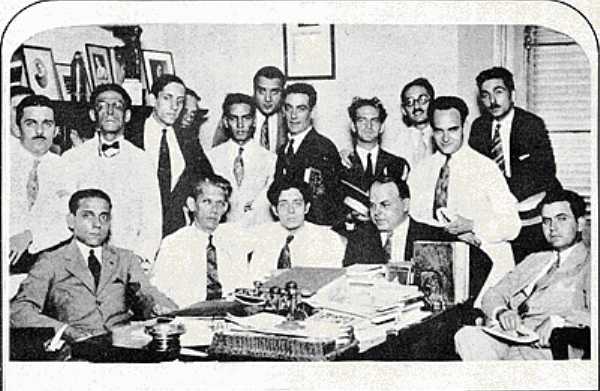4.1.1.24 The Minorista Group, its role in Cuban poetry (1923 – 1928)

Although the aforementioned anthology, “Modern Poetry in Cuba,” was compiled by members of the Minorista movement, as were the poets featured in it, the Minorista Group and its political and literary work go beyond the scope of this text, as the group’s importance lies not so much in the literary works they produced as in their cultural work and the proposal of an ethical foundation to guide the struggle toward emancipation from all forms of oppression.
The Group began to emerge after the Protest of the Thirteen, its signatories and those who supported the reasons for opposing the government of Alfredo Zayas, as the leader of administrative corruption and political subordination to North American interests. It constitutes a phenomenon of generational empathy, based on a shared ethic of defending indigenous culture and values, as well as a deep-rooted anti-imperialism.
The Minerva bookstore and the law firm of historian Emilio Roig de Leuchsenring, who was editor of the magazine “Social” and published many works by members of the group, both political and literary, served as spaces of casual concomitance and later deliberate encounters with a conspiratorial purpose and at the same time a vindication of national culture.
Alejo Carpentier says about this group, to which he also belonged: “Who were the first members of the Grupo Minorista? (…) There were literary aspirants who never wrote anything; there were writers who broke away when they saw that the group was adopting decidedly revolutionary political attitudes; there were also men who simply drifted toward other activities.”
However, those who remained in the group did so on the basis of a coincidence between ethics and culture, from a nationalist perspective, which in political matters would lead to a sustained opposition to the prevailing political situation (the group was later dissolved around 1928 due to the persecution of Machado’s police officers) and to American imperialism.
Although defined by a cultural vocation, not all were creators, and those who were essentially shared the presuppositions of modernism, already ossified, and the first steps of the avant-garde. Prominent in this regard are the voices of María Villar Buceta, José Zacarías Tallet, and Rubén Martínez Villena, whose lyrical message to the Peruvian José Torres Vidaurre is transcribed, as it defines the ethical and aesthetic foundation of the group:
“Our Cuba, you know well how conducive to hunting
of nations, and how it withstands the threat
permanent North that his ambition incubates:
Florida is an index that points towards Cuba.
(…)
It takes a charge to kill scoundrels,
to finish the work of the revolutions;
to avenge the dead, who suffer outrage,
to clean the tenacious coast of colonialism;
(…)
I swear by the blood that flowed from so many wounds,
long for the salvation of the beloved land,
despite all unjust persecution,
continue administering the caustic and the whip.”








